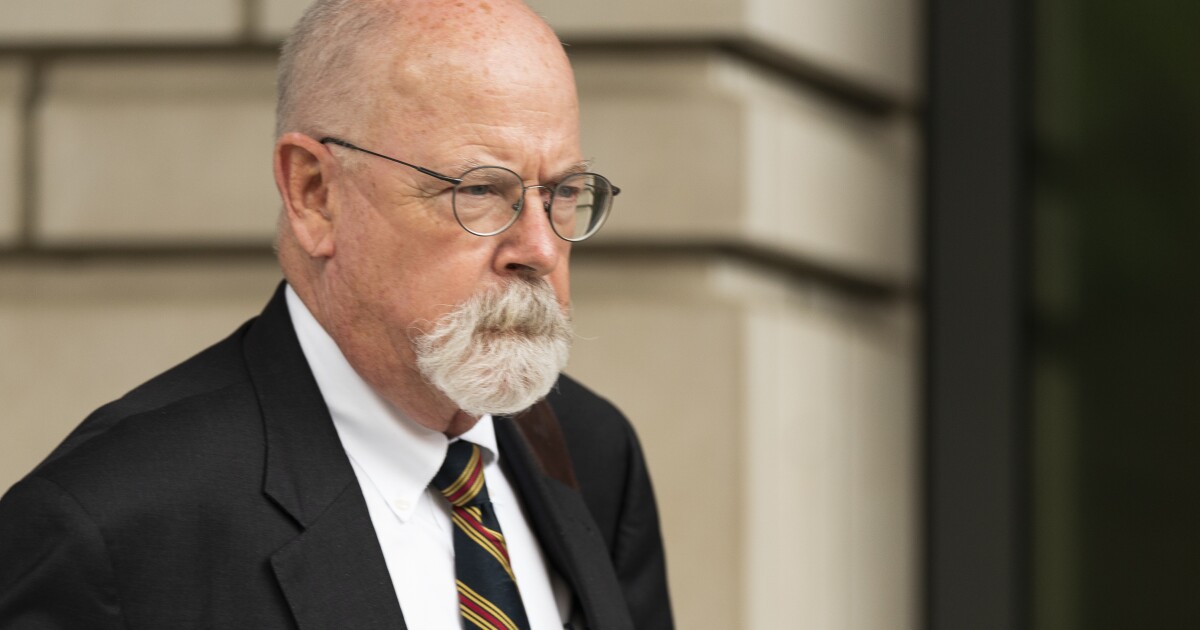

Two top Republican senators are demanding answers from special counsel John Durham about key Crossfire Hurricane figures who refused to cooperate in his investigation and whether he attempted to subpoena them.
Sens. Chuck Grassley (R-IA) and Ron Johnson (R-WI) on Tuesday sent a letter, first obtained by the Washington Examiner, to Durham pressing him on his investigation of the Trump-Russia investigators, noting that “it seems odd that individuals would be allowed to avoid fully cooperating with your office, particularly given your authority to compel testimony and records.”
THIS WEEK IS CRITICAL FOR DEBT CEILING NEGOTIATIONS
The GOP letter pointed out that several important figures either did not cooperate fully with Durham or did not cooperate at all, including fired FBI Director James Comey, fired FBI deputy director Andrew McCabe, fired FBI deputy assistant director of counterintelligence Peter Strzok, former assistant director of the FBI Counterintelligence Division Bill Priestap, convicted ex-FBI lawyer Kevin Clinesmith, and Fusion GPS co-founder Glenn Simpson.
Durham’s lengthy and “sobering” report concluded the FBI had no proper basis to launch the controversial 2016 election inquiry, which soon transformed into special counsel Robert Mueller’s sprawling investigation. The report also revealed there was never any evidence of Trump-Russia collusion, pointed to the Russian links behind British ex-spy Christopher Steele’s discredited dossier, and concluded that former Secretary of State Hillary Clinton’s campaign played a role in pushing collusion claims to the media and the FBI.
Grassley and Johnson told Durham that they “noticed that several high-level former government officials directly involved in Crossfire Hurricane either declined or partially declined to cooperate with your investigation” and pointed out that “some personnel” in the FBI’s Counterintelligence Division “refused to cooperate” with his review, and that FBI leadership then intervened to “urge those individuals to agree to be interviewed.”
The senators told Durham that “Congress requires additional information with respect to this refusal to cooperate and how it ultimately concluded.”
Grassley and Johnson noted that Mueller’s office “issued more than 2,800 subpoenas” and “executed nearly 500 search-and-seizure warrants” over the course of its investigation, but “in contrast,” the Durham investigation “served more than 190 subpoenas” and “executed seven search warrants.”
The senators asked Durham for “detailed information” on Comey, McCabe, Strzok, Priestap, Clinesmith, and Simpson, including whether Durham subpoenaed any of them and if not, why not; what any of the subpoenas sought as well as when and where the subpoenas were sent; and details on how each of the men refused to cooperate. They asked for this information by the end of May.
Grassley and Johnson also asked whether the Justice Department took any steps to “impede any of your office’s investigative activities.” Durham sent a letter to Attorney General Merrick Garland at the conclusion of his investigation to “thank you and your Office for permitting our inquiry to proceed independently and without interference.”
The senators also asked for information on which FBI counterintelligence personnel “refused to cooperate” with Durham. FBI deputy assistant director of counterintelligence Jill Murphy, who holds the same job that Priestap did, told Congress on Tuesday that she had neither read nor been briefed on the Durham report.
Comey
The Durham report said that Comey “declined through counsel to be interviewed by” Durham. Comey is currently on a book tour promoting his Central Park West mystery novel.
Comey had “requested relevant information pertaining to any presidential candidate” in April 2016, Durham said, and Comey was soon briefed on then-Trump campaign associate Carter Page, and in July 2016, FBI personnel described the Carter Page case “and ones like it” as “a top priority for Director Comey.” McCabe told the DOJ inspector general that Comey “was engaging on a very regular basis” with the Crossfire Hurricane team beginning in the summer of 2016.
It was apparently Comey’s decision to turn down a voluntary September 2016 offer from Carter Page to be interviewed by the bureau, and “the FBI did not interview Page until Comey approved the interview in March 2017.”
The former FBI director was also a key recipient of what Durham dubbed “Clinton Plan” intelligence, in which Clinton’s 2016 campaign allegedly planned to tie Trump to Russia to distract from her use of a private email server. Comey was told about this when John Brennan, then the director of the CIA, briefed him on it.
The CIA also sent a referral memo to the FBI on the “Clinton Plan” on Sept. 7, 2016. The memo was addressed to Comey and Strzok.
McCabe
Durham said McCabe “declined to be interviewed” by him. According to Durham’s report, Strzok opened Crossfire Hurricane “at the direction of” McCabe. FBI agent Jennifer Boone said that McCabe was “heavily involved in all aspects of the investigation” into Trump and Russia, and a DOJ attorney said that McCabe was pushing the Justice Department “to get this going.”
McCabe, who was hired by CNN as a contributor in 2019, went on Anderson Cooper’s CNN show last week, where he said that he “absolutely” stood by the launch and the conduct of the Trump-Russia investigation, saying Durham had “failed to come up with anything new” as he called the Durham inquiry “not a legitimate investigation” but instead a “political errand” against Trump’s perceived enemies.
Strzok
The Durham report said that “Strzok agreed to provide information to the Office concerning matters related to the FBI’s Alfa Bank investigation, but otherwise declined to be interviewed by the Office on matters related to his role in the Crossfire Hurricane investigation.”
Strzok spoke with Joy-Ann Reid on MSNBC last week and said that “Durham did not interview me except on the very narrow scope interview before I went into the grand jury” related to Clinton campaign lawyer Michael Sussmann but that, “had he interviewed me,” then he would have said, “it absolutely should have been opened.”
Sussmann had been charged by Durham after allegedly concealing his two clients, Neustar chief technology officer Rodney Joffe and Clinton’s 2016 campaign, from FBI General Counsel James Baker when he pushed debunked allegations of a secret line of communication between the Trump Organization and Russia’s Alfa Bank during a September 2016 meeting. But a jury found Sussmann not guilty of the false statement charge following a trial in the nation’s capital last year.
Durham wrote that Strzok and former FBI lawyer Lisa Page, with whom Strzok was exchanging anti-Trump texts and having an affair, were both “directly involved in matters relating to the opening of Crossfire Hurricane.” Strzok “both drafted and approved” the Trump-Russia launch document.
Priestap
Priestap only “agreed to provide information to the Office concerning matters related to the FBI’s Alfa Bank investigation, but otherwise declined to be interviewed,” Durham said.
The Trump-Russia investigation was opened by Strzok “with the authorization of” Priestap, with Priestap replying “Oh yeah” when asked if he was aware of Strzok and Lisa Page going around him to speak with McCabe directly. Priestap reportedly said this drove him “insane.” Another bureau official said that “Priestap was not in charge and had to get approvals from” top FBI leadership.
Durham said that Priestap was “also aware” of the Clinton Plan by Sept. 2, 2016, but the special counsel was “unable to determine the exact contours of Priestap’s knowledge, however, in part, because he declined to be interviewed by the Office on this subject.”
Clinesmith
Durham noted that “as part of his plea agreement, Clinesmith agreed ‘to be personally debriefed’ by the FBI regarding the FBI’s review of FISA matters and ‘any information he possesses … that should be brought to the attention’ of the” FISA Court, but Clinesmith “otherwise declined to be interviewed.”
Clinesmith admitted to Durham in 2020 that he falsified a document during the bureau’s efforts to renew FISA surveillance authority against Carter Page, fraudulently editing a CIA email in 2017 to state Carter Page was “not a source” for the agency.
The Durham report said Clinesmith “played a central role” in the Carter Page FISA process, and a DOJ attorney told Durham that Clinesmith informed him that Comey “wants to know what’s going on” and that McCabe asked who the FBI needed to speak with “to get this going.”
Simpson
Simpson and Fusion GPS hired Steele in 2016 after the opposition research firm was hired by the Clinton campaign by Clinton general counsel Marc Elias. Durham said that “Simpson declined to be interviewed by the Office.”
The Durham report cited emails “from Fusion GPS to members of the media” which “are a sampling of the correspondence regarding Carter Page that the Clinton/DNC-funded Fusion GPS sent to various members of the media from late July 2016 (the purported date the Clinton Plan intelligence was approved) through the fall of 2016.”
Elias
Durham also said that Elias “declined to be voluntarily interviewed by the Office.” Elias, who started the Elias Law Group in 2021, said he was aware of Fusion’s plans to have the discredited dossier author brief reporters during the 2016 contest, met with Steele in 2016, and periodically briefed the campaign about the findings from Fusion and Steele. Elias also coordinated closely with Sussmann, his former Perkins Coie law firm colleague, on anti-Trump research in 2016.
Clinton campaign manager Robby Mook testified he was “briefed about the Alfa Bank issue first” by Elias in the summer of 2016. Mook said that “I discussed it with Hillary as well” after the campaign team had discussed it. Mook said that “she agreed with the decision” to share the Alfa Bank claims with the media.
CLICK HERE TO READ MORE FROM THE WASHINGTON EXAMINER
Joffe
The Durham report revealed that Joffe also “declined to be voluntarily interviewed” by the special counsel.
Durham said Joffe also began tasking employees and associates in 2016 with mining and assembling internet data that would support an “inference” or “narrative” tying Trump to Russia, with the tech executive stating in emails that the goal was to please “VIPs” — apparently referring to Sussmann, Elias, and the Clinton campaign.




